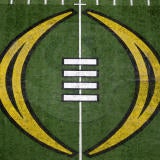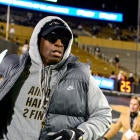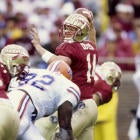Fifteen antitrust-law professors on Friday filed a brief with the 9th U.S. Circuit Court of Appeals supporting the NCAA’s appeal in the Ed O’Bannon case.
In the brief, the professors wrote that U.S. District Judge Claudia Wilken “misapplied” the less-restrictive alternative prong of her analysis that found the NCAA violated antitrust law. Wilken’s injunction raised the cap of compensating football and men’s basketball players from athletic scholarships to full cost of attendance plus the allowance of deferred compensation that the NCAA could cap at no less than $5,000 per year.
Other briefs filed Friday supporting the NCAA in the O'Bannon appeal came from CBS, ABC, Fox, NBC, TBS and other media organizations; and the American Council on Education, the Association of Governing Boards of Universities and Colleges, and the National Association of Independent Colleges and Universities.
In the brief written by the anti-trust law professors, they argued that if Wilken’s judgment is upheld, it “would substantially expand the power of the federal courts to alter organizational rules that serve important social and academic interests. ... This approach expands the ‘less restrictive alternative prong’ of the antitrust rule of reason well beyond any appropriate boundaries and would install the judiciary as a regulatory agency for collegiate athletics.”
The professors wrote there is “limited appellate authority” regarding the question about the scope of the less-restrictive alternative. Most cases are decided by a plaintiff’s failure to establish harm to competition, or a defendant’s failure to support a procompetitive justification, the brief states.
But the professors argued there are precedents “that make it clear the district court overstepped its bounds" and allowing antitrust courts to “impose their own views” could leave other organizations open to suit.
“For example, a court could easily follow the reasoning below to require compensation for Little League baseball players at a level deemed ‘fair’ by a district judge,” the professors wrote. “Similarly, a kennel club could be required to alter its breed standard if a breeder claims to have been excluded because their dogs are an inch or two shorter than the adopted standard. … Courts would have free rein to rewrite any rule adopted by an organization plausibly found to have restrained a relevant market if they can identify modest changes that may (or may not) be fairer.”
The brief was signed by these antitrust-law professors:
* Thomas C. Arthur, L. Q. C. Lamar Professor of Law, Emory University School of Law
* Amitai Aviram, Professor of Law, University of Illinois College of Law
* Edward D. Cavanagh, Professor of Law, St. John’s University School of Law
* Jorge L. Contreras, Associate Professor of Law, University of Utah, S.J. Quinney College of Law
* Daniel Crane, Associate Dean for Faculty and Research and Frederick
* Paul Furth, Sr. Professor of Law, University of Michigan Law School
* Susan Beth Farmer, McQuaide Blasko Faculty Scholar & Professor of Law and International Affairs, Pennsylvania State University, Dickinson School of Law
* Herbert Hovenkamp, Ben and Dorothy Willie Chair, University of Iowa College of Law
* Keith N. Hylton, William Fairfield Warren Distinguished & Professor of Law, Boston University School of Law
* Michael S. Jacobs, Distinguished Research Professor of Law, DePaul University College of Law
* Alan J. Meese, Ball Professor of Law and Cabell Research Professor, College of William & Mary Law School
* Salil K. Mehra, Professor of Law, Temple University Beasley School of Law
* Gary R. Roberts, Dean Emeritus and Gerald L. Bepko Professor of Law, Indiana University Robert H. McKinney School of Law
* William H. Page, Professor & Marshall M. Criser Eminent Scholar in Electronic Communications and Adminstative Law, University of Florida Levin College of Law
* D. Daniel Sokol, Professor of Law, University of Florida Levin College of Law
* Alexander Volokh, Associate Professor of Law, Emory University School of Law




















